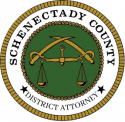About the Grand Jury Bureau:
The Grand Jury Bureau is a unit that handles a variety of felony-level cases that are not otherwise assigned to a specialized bureau within the District Attorney’s Office. This Bureau is tasked with investigating and prosecuting cases such as serious assaults, residential and commercial burglaries, robberies, drug crimes, vehicular thefts, and felony-level larcenies. Assistant District Attorneys assigned to this Unit are vertical prosecutors. They handle their assigned cases from the initial arrest through trial. They also handle their own grand jury presentations, discovery, motions, plea negotiations, hearings, and trials.
What is the Grand Jury process:
Article 190 of the Criminal Procedure Law is the legal framework for the grand jury. The Grand Jury is impaneled by the Schenectady County Court from the community consisting of twenty-three sworn jurors. Those jurors are randomly selected members of the county that sit for a specified term, approximately two months. The Grand Jury’s primary function is to hear and examine evidence concerning felony-level criminal cases, and then determine whether a person should be charged with the commission of an offense and face trial for it. They do not determine guilt or innocence. The Grand Jury is an independent civilian arm of the court that determines, after a preliminary presentation, whether or not the District Attorney can proceed with felony-level charges against a person. The District Attorney and his assistants are the legal adviser to the Grand Jury. They question witnesses and subpoena documents for the grand jurors to review. Grand jurors can also ask questions of all witnesses and can request that the prosecutor subpoena additional witnesses. A person who is charged with a felony has a right to testify before the grand jury. When a grand jury finds that a person should be charged with an offense, they have voted to hand up an “indictment” against that person. If the grand jury decides not to indict someone it is referred to as voting a “no true bill.” The Grand Jury can also direct the prosecutor to file an information for a lesser level offense, can refer a case to Family Court and can issue a grand jury report.
Additionally, Grand Jurors take an oath of secrecy and may also examine evidence of misconduct in public office. They also occasionally hear cases involving very serious offenses allegedly committed by juveniles.

